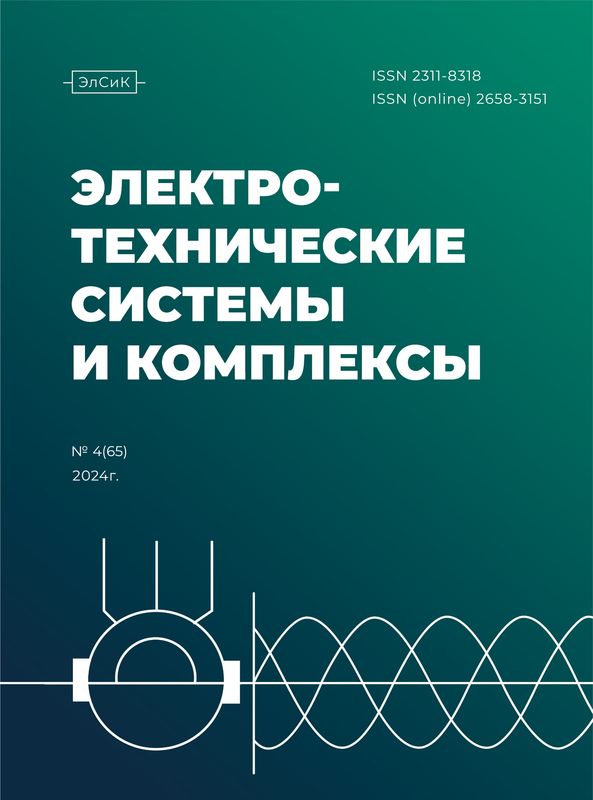Abstract
At present, thermal power plants account for about 60% of generating equipment in the Russian energy system. To effectively control the mode of operation of the power system, due to the low flexibility of thermal generation, predictive information about the hourly electrical load of all consumers is required. In this regard, the purchase of electricity on the wholesale electricity and capacity market (WECM) presupposes a short-term forecast of its own hourly electricity consumption. Suppliers of last resort purchase the required volumes of electricity on the wholesale electricity market for its further sale to end consumers. Errors in short-term forecasting of electricity consumption worsen the financial indicators of guaranteed suppliers, and also increase the price of electricity for end users by paying for unreasonable start-ups and shutdowns of generating equipment, as well as additional losses of electricity caused by the choice of a non-optimal scheme of electrical networks. The most important condition for achieving high accuracy of short-term forecasting is the choice of the optimal forecasting algorithm. This article is devoted to the issues of increasing the accuracy of short-term forecasting of hourly electricity consumption of groups of supply points of a guaranteeing electricity supplier using artificial neural network tools including deep learning. A comparative analysis of the accuracy of short-term prediction of power consumption of a multilayer perceptron, one-dimensional and two-dimensional convolutional neural networks, a recurrent neural network, an ensemble of deep neural networks, as well as the method of expert estimates based on retrospective and actual data has been carried out. On the test sample of data, the ensemble of neural networks demonstrated an average prediction error of 1.05%, which is 1.99% lower than the forecast error of a multilayer perceptron. With regard to the factual data, the ensemble neural network algorithm demonstrated a forecast error of 2.45% on an annual interval, which is 0.14% lower than the forecast error obtained using the method of expert estimates. An assessment of the expected annual economic effect from an increase in the accuracy of short-term forecasting of electricity consumption was made, which amounted to 256,865.8 rubles.
Keywords
Artificial neural network, short-term load forecasting, forecasting error, forecasting algorithm, wholesale electricity and power market, factors, hyperparameters, training sample, free parameters, stochastic gradient descent, training.
1. Kler A.M., Stepanova Е.L., Maksimov А.S. Enhancement of CHP operating modes taking into account the real state of the primary equipment. Teploenergetika [Thermal Engineering], 2009, no. 6, pp. 53–57. (In Russian)
2. Domanov V.I., Bilalova A.I. Forecasting power consumption based on source information. Vestnik yuzhno-uralskogo gosudarstvennogo universiteta. Seriya: Energetika [Bulletin of the South Ural State University. Series "Power Engineering"], 2016; vol. 16, no. 2, pp. 59–65. doi: https://doi.org/10.14529/power160208 (In Russian)
3. Serebryakov N.A. Analysis of factors affecting the electricity consumption of a delivery point cluster default provider. Vestnik Irkutskogo gosudarstvennogo tehnicheskogo universiteta [Proceedings of Irkutsk State Technical University], 2020, vol. 24, no. 2, pp. 366–381. doi: https://doi.org/10.21285/1814-3520-2020-2-366-381 (In Russian)
4. Katasev A.S. Neuro-fuzzy model of fuzzy rules formation for objects state evaluation in conditions of uncertainty. Computer Research and Modeling. 2019, vol. 11(3). pp. 477–492. doi: 10.20537/2076-7633-2019-11-3-477-492.
5. Stankevich T.S. Development of operational prediction method of forest fire dynamics based on artificial intelligence and deep machine learning. Vestnik Irkutskogo gosudarstvennogo tekhnicheskogo universiteta [Proceedings of Irkutsk State Technical University], 2018, vol. 22, no. 9, pp. 111–120. doi: 10.21285/1814-3520-2018-9-111-120. (In Russian)
6. Masood N.A., Ahsan Q. A Methodology for identification of weather sensitive component of electrical load using empirical mode decomposition technique. Energy and Power Engineering. 2013. Vol. 5. Pp. 293-300.
7. Khomutov S.O., Serebryakov N.A. Creation of a short-term load forecasting neural network model of electrical engineering complex of section regional electric grid. Transportnye sistemy i tekhnologii [Transportation Systems and Technology], 2020, vol. 6, no. 1, pp. 80-91. doi: 10.17816/transsyst20206100-00. (In Russian)
8. Boyarkin D.A., Krupenev D.S., Yakubovskiy D.V. Machine learning in electric power systems adequacy assessment using Monte Carlo method. Vestnik YuUrGU. Seriya: Matematicheskoe modelirovanie i programmirovanie. [Bulletin of the South Ural State University. Series "Mathematical Modelling, Programming & Computer Software"], 2018, vol. 11, no. 4, pp. 146–153. doi: 10.14529/mmp180411. (In Russian)
9. Toropov A.S., Tulikov A.N. Forecasting of regional power supply system power consumption per hour using artificial neural networks. Vestnik Irkutskogo gosudarstvennogo tehnicheskogo universiteta. [Proceedings of Irkutsk State Technical University], 2017, vol. 21, no. 5, pp. 143–151. https://doi.org/10.21285/1814-3520-2017-5-143-151 (In Russian)
10. Kirpichnikova I.M., Saplin L.A., Solomakho K.L. Energy consumption forecasting. Vestnik yuzhno-uralskogo gosudarstvennogo universiteta. Seriya: Energetika. [Bulletin of the South Ural State University. Series "Power Engineering"], 2014, vol. 14, no. 2, pp. 16–22. (In Russian)
11. Ivanin O.A., Direktor L.B. The Use of Artificial Neural Networks for Forecasting the Electric Demand of Stand-Alone Consumers. Teploenergetika [Thermal Engineering], 2018, no. 5, pp. 17–26. https://doi.org/10.1134/S0040363618050041 (In Russian)
12. Nadtoka I.I., Husejn A.Z.B.M. Short-Term Forecasting of Electricity Consumption of Region Taking Into Account Meteorological Factors Based on Method Support Vectors and the Algorithm of Particle Swarm. Izvestiya vysshih uchebnyh zavedenij. Elektromehanika. [Russian Electromechanics], 2014, no. 3, pp. 44–47. (In Russian)
13. Srivastava N., Hinton G., Krizhevsky A., Sutskever I., Salakhutdinov R. Dropout: a simple way to prevent neural networks from overfitting. Journal of Machine Learning Research. 2014. Vol. 15, pp. 1929-1958.
14. Iofee S., Szegedy C. Batch Normalization: Accelerating deep network training by reducing internal covariate shift. Available at: https://arxiv.org/pdf/1502.03167.pdf (accessed 02 March 2020)
15. Zhukov A.V., Sidorov D.N. Modification of random forest based approach for streaming data with concept drift. Vestnik YuUrGU. Seriya “Matematicheskoe modelirovanie i programmirovanie. [Bulletin of the South Ural State University. Series "Mathematical Modelling, Programming & Computer Software"], 2016, vol. 9, no. 4, pp. 86–95. doi: 10.14529/mmp160408. (In Russian)
16. Kingma D.P., Lei Ba J. ADAM: a method for stochastic optimization. Available at: https://arxiv.org/abs/1412.6980 (accessed 12 December 2020)
17. Voevoda A.A., Romannikov D.O. Synthesis of a neural network for the implementation of the recursive leastsquares method. Nauchnyi vestnik Novosibirskogo gosudarstvennogo tekhnicheskogo universiteta. [Scientific Bulletin of NSTU], 2018, no. 3(72), pp. 33–42. doi: 10.17212/1814-1196-2018-3-33-42. (In Russian)
18. Li L., Jamieson K., Desalvo G., Rostamizadeh A., Talwalkar A. Hyperband: A Novel Bandit-Based Approach to Hyperparameter Optimization. Available at: https://arxiv.org/pdf/1603.06560.pdf (accessed 18 April 2021).
19. Wang Z., Srinivasan R. A review of artificial intelligence based building energy use prediction: Contrasting the capabilities of single and ensemble prediction models. Renewable and Sustainable Energy Reviews. 2017. Vol. 75. Pp. 796–808.
20. Khomutov S. O., Khamitov R. N., Gritsay A. S., Serebryakov N.A. Method of learning sample forming in the problems of short-term forecasting of power consumption of the last resort supplier. Izvestiya Tulskogo gosudarstvennogo universiteta. Tekhnicheskie nauki [Izvestiya TulGU], 2021, Iss. 2, pp. 227-233. (In Russian)










